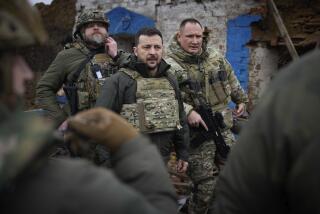Yeltsin Says He’ll Prune Back Overgrown Cabinet
- Share via
MOSCOW — Heads will roll in the Russian hierarchy, President Boris N. Yeltsin vowed Tuesday in announcing an impending government shake-up aimed at stirring new life into a stagnant reform movement.
Making good on threats issued in his state of the nation address five days earlier, the recently invigorated 66-year-old president promised a major streamlining of the unwieldy Cabinet that has swelled to include 50 ministers, agency chiefs and commissioners--even as debts, tax dodging and corruption have flourished.
Yeltsin named no names on the hit list, but his aides made clear that Prime Minister Viktor S. Chernomyrdin and the increasingly powerful Anatoly B. Chubais--named first deputy prime minister Friday--would be the only ministers not expected to turn in their resignations.
But in keeping with long-standing Kremlin traditions of illusion and intrigue, titles mean less than the personal clout of those who hold them. Chubais, the most ardent advocate of capitalism in the Yeltsin camp, is likely to emerge as de facto head of both Kremlin administration and the new Chernomyrdin government, with a mandate to jump-start the stalled economic revolution.
Chubais, 41, had served as Kremlin chief of staff since Yeltsin’s reelection in July. His move to first deputy premiership was believed to signal Yeltsin’s determination to shape up the government, which has fallen behind nearly $9 billion in paying state salaries and pensions while Yeltsin was sidelined for most of the past nine months by health problems.
Yeltsin named a journalist with little political experience, Valentin Yumashev, as his new chief of staff, effectively diminishing the post in which Chubais was believed to have wielded considerable power during Yeltsin’s absence. Yevgeny I. Shaposhnikov, a former defense minister who leads the national Aeroflot carrier, was appointed as Yeltsin’s aide.
Some analysts speculated that Chubais might soon be elevated to replace Chernomyrdin, perhaps after a planned March 27 protest by public employees expected to paralyze transportation and industry across this vast federation.
In an attempt to ignite public outrage over the expanding power of the unpopular Chubais, Communist Party lawmaker Valentin A. Kuptsov warned that the economic strategist widely respected in the West “may even claim the presidency in the future.”
“The traditional route--through elections--is unrealistic for [Chubais],” Kuptsov said. “The only possibility would be for him to become acting prime minister.”
Under the Russian Constitution, the prime minister becomes temporary head of state if the president dies in office.
Chubais has stepped on toes with his unflinching support of market reforms, despite the social hardships they have inflicted. But it is that commitment Yeltsin probably is counting on to resolve the government debt crisis and persuade the International Monetary Fund that it should resume $10 billion in loans and credits to Russia suspended late last year because of the government’s failure to collect delinquent taxes.
Yeltsin was considered more likely to retain the equally unpopular Chernomyrdin, at least as a figurehead prime minister, primarily because elevation of Chubais as Cabinet chief and heir apparent would so enrage the Communist-dominated parliament that a leadership crisis would ensue. Parliament must approve the president’s choice for prime minister or risk being disbanded.
Chubais has been a lightning rod for wrath over perceived injustices in the privatization programs he has directed over the past six years. Intelligent and articulate--and often impatient with those who are neither--he is distrusted as an outsider in the Moscow power structure because of his St. Petersburg background.
He is unapologetic about his close ties with Western economists and the lucrative foreign consulting jobs he held while out of office, and his penchant for tapping out notes on a laptop computer at Cabinet meetings has won him a techno-nerd reputation in a country where that is yet to be considered cool.
Among other officials, Defense Minister Igor N. Rodionov was seen as likely to be sacked in the shake-up. He was soundly criticized by Yeltsin last month for “whining” about the sorry state of the armed forces.
Several industrial ministers also were expected to be removed from the Cabinet or have their offices merged to slim down the top-heavy government.
Foreign Minister Yevgeny M. Primakov is 67 and a relic of the Cold War era, but he has overseen an improvement of relations with China and other eastern neighbors that some observers believe may spare him from the cuts.
“I don’t know what the president will decide, but I hope to see you next time,” Primakov quipped to reporters after talks in Moscow with Israeli Prime Minister Benjamin Netanyahu.
Chernomyrdin told reporters that Yeltsin was likely to submit a new Cabinet himself before the weekend.
More to Read
Sign up for Essential California
The most important California stories and recommendations in your inbox every morning.
You may occasionally receive promotional content from the Los Angeles Times.














